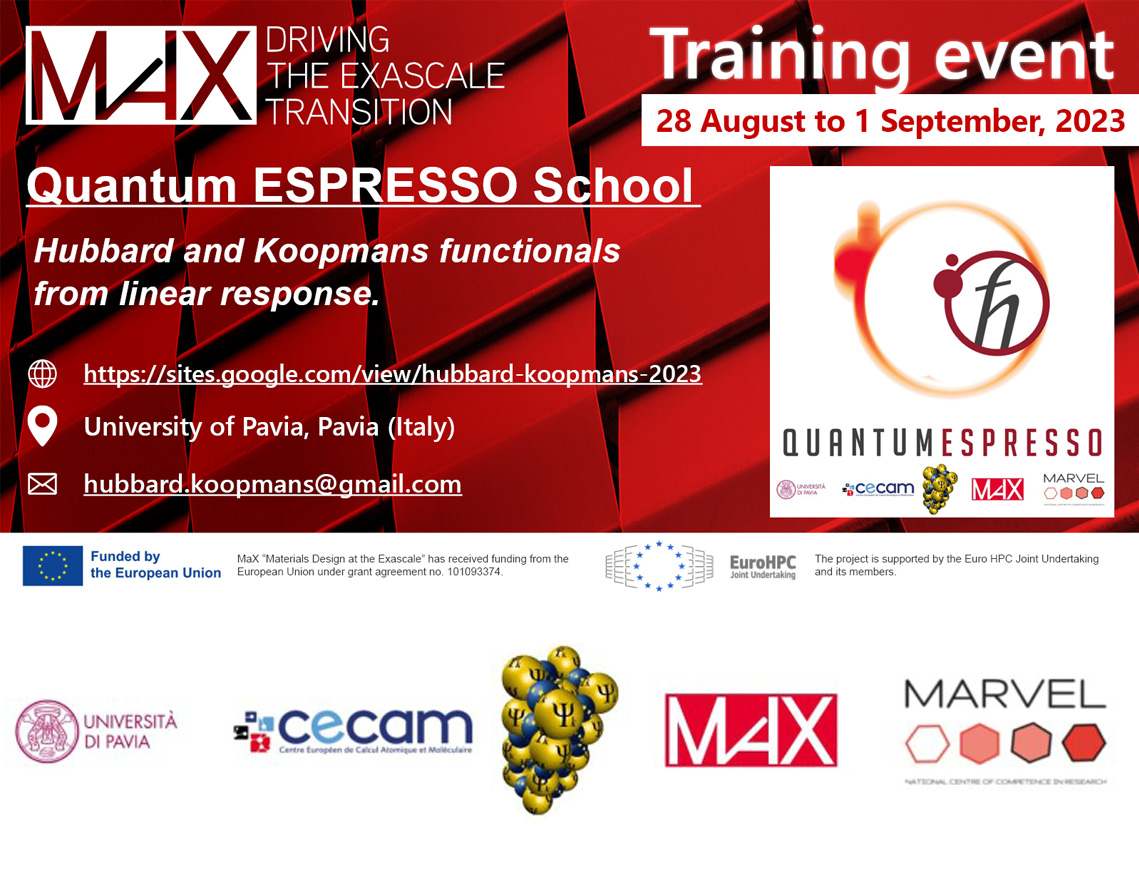
Density functional theory (DFT) is nowadays the main tool for computational modeling of realistic materials from first principles. Notwithstanding the great and predictive success of DFT with standard local and semilocal exchange-correlation functionals, the growing level of sophistication of the target applications pushes for the development of advanced energy functionals that are more accurate, yet computationally affordable.
The goal of this school is to introduce PhD students, postdocs, and junior scientists to the use of advanced functionals aimed at modeling complex materials, such as the extended Hubbard and Koopmans functionals [1,2]. By eliminating self-interaction errors and restoring total energy piecewise linearity, these advances broaden the scope of DFT by either improving the ground-state description of transition-metal and rare-earth compounds or by giving access to accurate spectral properties (like fundamental band gaps and band structures). Indeed, Hubbard and Koopmans functionals are deeply rooted in the theory of DFT and try to address fundamental difficulties of its Kohn-Sham declination. Their actual implementation also takes advantage of linear-response theory through the self-consistent incarnation contained in density-functional perturbation theory (DFPT) [3].
In view of these goals, the first part of the school (2 days) will be devoted to an introduction to fundamental aspects of DFT and DFPT and to some of their basic applications (e.g. calculation of the ground-state and lattice-vibrational properties). In the next 2 days, the school will cover the theoretical framework of Hubbard and Koopmans functionals (the main topic of this event). This is complemented by a 1-day primer on automation techniques (based on the AiiDA framework [4]) to manage computational workflows involving the above methods. The reference computational platform of the school will be Quantum ESPRESSO (QE), a widely used open-source electronic-structure software [4], which implements both extended Hubbard and Koopmans functionals.
The intensive program will offer (i) presentations by keynote speakers with a broad overview on the topic of the day, (ii) theoretical and technical lectures by some of the leading developers of the QE project, as well as (iii) demonstrations and dedicated hands-on sessions on both basic and more advanced features. Importantly, the participants will learn how to compute the Hubbard parameters and Koopmans screening coefficients from DFPT. Since QE is an open-source platform for ab initio calculations the school will provide a practical and operative knowledge of the discussed topics that participants will be able to use directly in their own research or educational activities.
Deadline for applications: 21st May 2023
Details available at this link
References
[1] I. Timrov, N. Marzari, M. Cococcioni, Phys. Rev. B 98, 085127 (2018); Phys. Rev. B 103, 045141 (2021); Comput. Phys. Commun. 279, 108455 (2022); V. L. Campo Jr and M. Cococcioni, J. Phys.: Condens. Matter 22, 055602 (2010).
[2] I. Dabo et al., Phys. Rev. B 82, 115121 (2010); L. N. Nguyen et al., Phys. Rev. X 8, 021051 (2018); N. Colonna et al., J. Chem. Theory Comput. 18, 5435 (2022).
[3] S. Baroni, P. Giannozzi, A. Testa, Phys. Rev. Lett. 58, 1861 (1987); X. Gonze, Phys. Rev. A 52, 1086 (1995); S. Baroni, S. de Gironcoli, A. Dal Corso, P. Giannozzi, Rev. Mod. Phys. 73, 515 (2001).
[4] G. Pizzi et al., Comput. Mater. Sci. 111, 218 (2016); S.P. Huber et al., Sci. data 7, 1 (2020)
[5] P. Giannozzi et al., J. Phys.: Condens. Matter 21, 395502 (2009); J. Phys.: Condens. Matter 29, 465901 (2017).

